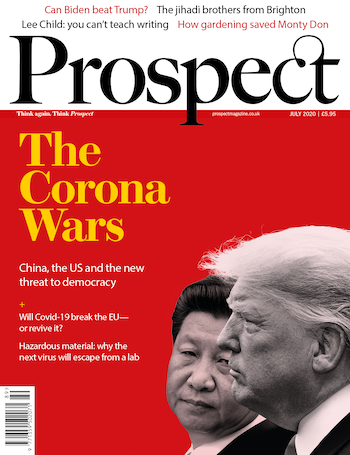
If the first duty of the state is the safety of its citizens, then something that puts in jeopardy the safety of citizens everywhere is bound to have a bearing on the standing of states around the world.
Sure enough, just three months on from the pandemic being declared, its geopolitical ramifications are being felt. Diplomats report that the reputation of “the west” is in freefall in those many Asian states that have contained the virus better. On the continent, from public health to border control and the single currency, the strains of the crisis will require EU member states to hang more tightly together with closer co-ordination—or otherwise hang apart. (Anu Bradford and Bruno Maçães debate which of these two directions it is likely to go.) Most palpable of all, however, is the sense of Chinese power waxing while American power wanes.
Beijing has been able to protect its people from the new coronavirus far better than today’s abjectly dis-United States: as of June, the number of Covid-19 deaths per million Americans looks to be roughly 100 times that for every million Chinese. And as our outgoing deputy editor Steve Bloomfield explains in a magisterial valedictory essay, President Xi’s regime has wasted no time in turning this relative success to propaganda advantage. As Donald Trump destroys alliances abroad, and incites violent division at home (and if you’re still scratching your head about what game he’s playing, Sam Tanenhaus does the electoral calculation), the PR war is a breeze for the People’s Republic.
All this breeds a new assertiveness in China, which has already been keenly felt in Hong Kong where after long months of a fraught and grudging stand-off, Beijing has just moved to impose a new national security law by decree, making a mockery of the supposed “one country, two systems” settlement. Steve’s darkest fear is that a confluence of events—the suspension of civil liberties in the lockdown, Trump’s destruction of democratic mores, and China’s increasing plausibility as an authoritarian paradigm—could combine to trigger a catastrophic failure of nerve in the democracies. He insists that this must be resisted not only on principle, but also because—on a long view, and a broad canvas—liberal democracy is still the best system for running things that humanity has ever devised.
While Steve hankers for high-minded leadership and a new league of true democracies to transcend ugly alliances of convenience, Mark Leonard admits to being impressed by the ruthless pragmatism of Europe’s new generation of rulers. Austrian Chancellor Sebastian Kurz and Danish PM Mette Frederiksen are among those who have answered nativist populist forces, not by making a haughty stand for liberal values, but rather by stealing their thunder. Egotistical and impatient with diplomatic protocol, the rising statesmen and women might look like leaders to doom the European project, but after so many lost referenda and so much sclerosis, Leonard concludes that the last best hope for multilateralism might just be politicians who have the cunning and guile to make the case for it in nationalist terms.
Well, let’s hope so. Because when it comes to pandemics—as everything in 2020 eventually does—there is ultimately no plausible alternative to working across borders.
That much is evident when we look back to the last big outbreak of a deadly virus. According to Katherina Thomas, who spent time in Liberia as it picked up the pieces after Ebola, there are today heartening signs of co-ordination and the sharing of ideas across African communities and countries in ways which would appear to be checking the spread of Covid-19.
It is evident, too, if we try and look forward to the next great pestilence that will befall us. The bestselling historian Peter Frankopan has proven prognostic credentials, having accurately predicted a pandemic in our pages in early December last year. He returns with a terrifying dispatch about the many mishaps that occur in all the facilities around the world that are researching virology and bio-weapons—from flaming gas canisters in the Siberian lab that still holds the smallpox virus, to Dengue fever samples being popped in the British post. Most of these facilities are avowedly focused on national defence, but if—or perhaps we should say when—one of them finally loses control, the crisis will belong to the world as a whole.
And yet today human vulnerability is being preyed on for political and nationalist purposes. A few months after he had pushed the world to an existential brink in the Cuban missile crisis, a very different US president found the humility to speak these words: “our most basic common link is that we all inhabit this small planet. We all breathe the same air. We all cherish our children’s future. And we are all mortal.” Here’s hoping our own grandstanding politicians can muster a bit of JFK’s wisdom.












